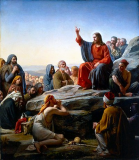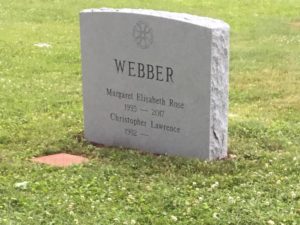Resurrection People
This sermon was preached by Christopher L. Webber at the Church of the Incarnation, San Francisco, on February 17, 2019.
“how can some of you say there is no resurrection of the dead?” 1 Corinthians 15:12-20
I grew up in a small town in upstate New York – twenty-five hundred people – and maybe I didn’t know all of them, but I certainly knew all the people up and down the street I lived on – and they knew me. Actually, some of them didn’t. I’ve never forgotten going somewhere with my brother one day – we were maybe six and eight years old – and meeting a lady who said, “Now which one of you is Christopher and which one is Michael?” I was totally flummoxed. It hadn’t occurred to me that someone might not know. It was a town where no one locked their doors. A different world.
So when I watch the news and hear the President lying about basic facts – what they call “alternative facts” – I’m having to learn again to live in a different world: a world where you can’t be sure that the President has the best interests of the country at heart and where you know he doesn’t see the same world you do. I look at the Mexican border and see women and children fleeing conditions we can’t even imagine. What would it take to get you to walk a thousand miles to get into a country where you didn’t even speak the language? I read last week about an Episcopal church sponsored program to provide food and medicine and clothing for them. They look around and they see human need. The President looks at the same people and sees rapists and murderers.
Of course, my view of the world is shaped by 80-plus years of going to church and listening to the Bible. If you play golf on Sunday morning, that also shapes your vision; you never hear about that other world.
But is there ever a clearer contrast than in the readings this morning? Is there anything more basic to Christian faith than these readings? We think of “the Sermon on the Mount” as basic, but Luke’s version – as we read it this morning – is a sermon on a level place and Luke’s version is more down to earth in other ways as well.
“Blessed are you who are poor,
for yours is the kingdom of God.
“Blessed are you who are hungry now,
for you will be filled.
“Blessed are you who weep now,
for you will laugh.”
“But woe to you who are rich,
for you have received your consolation.
“Woe to you who are full now,
for you will be hungry.”
If you don’t hear such words as those once a week, you might well imagine that building walls against the poor and helpless is appropriate. You night well imagine that heaping up riches was the way to go. And maybe that’s the world most people live in. It may be that we are the ones who are being fed a diet of alternative facts when we read the Bible. Certainly it’s an alternative world that the gospel pictures, not the one we see when we step outside.
I live in a micro-world of a hundred or so elderly residents, many in wheel chairs, many totally dependent on others to get dressed, get breakfast, get around. And those others on whom they depend are often immigrants who have left their families behind for the chance to make a decent living. But most of them get paid the basic minimum $15 an hour and have to commute long distances because they can’t afford to live in the city. Yet I often go out early to get the N-Judah and walk past dozens of young people waiting on the street corner for the giant bus that will come by and scoop them up to spend the day in Silicon Valley. So on the one hand we have people who live in the city but don’t work here; on the other hand, people who work in the city but can’t live here. Does that make any sense? What kind of world is it that pays minimum wage to those who care for the elderly and several times as much to people who spend their days designing computer games?
It’s good that some of us at least come to church on Sunday and hear about another world and have our way of thinking changed. The Psalm today also reminded us that there are two ways of thinking and living:
Happy are they who have not walked in the counsel of the wicked, *
nor lingered in the way of sinners,
nor sat in the seats of the scornful!
2 Their delight is in the law of the Lord, *
and they meditate on his law day and night.
But it’s not just that there are two ways of thinking, two ways of living, it’s the recognition of an alternative reality. It’s the understanding that we live in a different world, a world transformed by the life and death and resurrection of Jesus.
Paul is on that case in the second reading. He’s baffled by the fact that some Christians, some members of the church, are saying there is no resurrection. If there is no resurrection, why are you here? “If Christ has not been raised,” Paul writes, “your faith is futile . . . If for this life only we have hoped in Christ, we are of all people most to be pitied.”
Unless we are resurrection people, we are still living in a world of fear, where we have to lock the doors against our neighbors and hoard our possessions knowing no one will help us if we’re in need.
Unless we are resurrection people, we have to build walls every day to protect ourselves and have no time or energy to help anyone else. And that’s the world, unfortunately, our President lives in and that he wants us also to live in. And it’s hard not to. It’s hard to swim against such a powerful current and to hold fast the faith that there is another way.
But there IS another way. We ARE resurrection people. We are followers, Paul reminds us, of a risen Lord who has passed through death. There is another way. It makes a difference, an ultimate, life-changing difference.
Now, I’ve believed that, more or less, my whole life. But I’ve learned something more this last year. My wife died a year ago last October. Some of you attended her funeral service. Last June I went to Connecticut to dedicate the stone that marks her burial place – and mine.
Now, I’ve lost close friends and family members before, but this was different; this was qualitatively different. Some of you, of course, have gone through that same experience: the loss of a spouse, death of a child. It changes us. But what I’ve slowly realized as the days and weeks have gone by is that death has lost its sting, lost its terror. Husband and wife, we say, “become one flesh in holy matrimony.” I take that seriously. It means that I was and am involved in her life in a totally different way: that where she is, I am already. So how can I be afraid of being there forever?
As I asked myself questions like that – came to that realization – I also realized in a whole new way, and at a deeper level what I have always claimed to believe at the very center of the Christian faith: that Jesus died, that he rose again to eternal life, and that in him, I also have life.
And I’ve come to realize that I know something now that I hadn’t fully taken in before. Death is less fearful now – not more. Husband and wife, as I said, are joined in one body, one life, and with my wife’s death, I also have died to this world in a very real sense, part of me has died, and that makes a difference. I don’t share the values of those whose focus is this life only; whose lives are shaped by fear, who live only to protect themselves with walls and wealth, who live for this world only.
I should have understand that long ago at a deeper level.
I’m still planning to hang a round a good while longer. I’ve got lots of plans, lots of things to do, but when the time comes to move on, as it will, a lot of the fear is gone, and should have been gone long ago because I am also one with Christ in baptism, and he also has passed through death into life and I have died with him, as St Paul says, and in him I share already the fuller, richer life still to come. And this life that we were given in baptism is the life we receive today at the altar: “The body of Christ, the bread of heaven,” a foretaste of the heavenly banquet.
Let’s remember who we are: we are Resurrection people. Resurrection people. We are the people of God in whom Christ is alive and in whom we live as Resurrection people; in whom we have the gift and the promise of life hereafter forever.

 Christopher L. Webber
Christopher L. Webber
Dear Chris, thank you for this beautiful sermon. It refreshes me. Lisa